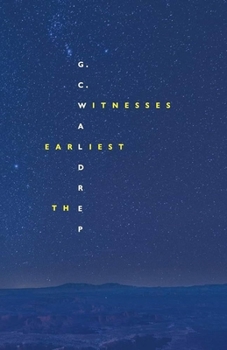The Earliest Witnesses
In the poems of The Earliest Witnesses, witnesses need a place to begin-they spiral off from a walk, a church, an orchard, to go into deeper meditation about faith, earth, restraint, desire, and violence. Waldrep's seventh collection begins where his prior collection, feast gently, left off: "This / is how the witness ends: touch, withdraw; touch again," according to the opening poem. The status of witnesses is never constant and never settled in this book: sometimes, witnesses "foster," "touch," and "stain" the places they inhabit; other times, they befriend, or document, or think. Sometimes, witnesses forget themselves-in questions of blame and responsibility-and sometimes they feel forgotten and unknown. If these are poems of witness, then they are also testators to the craft of seeing: "Can you see this," the ophthalmologist in "A Mystic's Guide to Arches" asks over and over again. Here, sight facilitates and impedes desire; it colludes with language itself. "She said, When you say pear, I see p-e-a-r for a second before I see, in my mind's eye, a pear," Waldrep carefully records in " West Stow Orchard Poem (II)]." The desire-poems in The Earliest Witnesses want the thing itself, its image of the mind, and the language that transmutes both thing and image into song.
Format:Paperback
Language:English
ISBN:194648248X
ISBN13:9781946482488
Release Date:December 2020
Publisher:Tupelo Press
Length:130 Pages
Weight:0.50 lbs.
Dimensions:0.3" x 5.5" x 8.5"
Related Subjects
PoetryCustomer Reviews
0 rating





